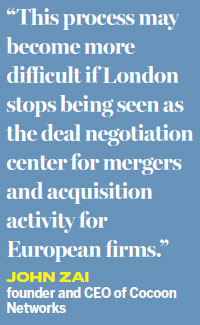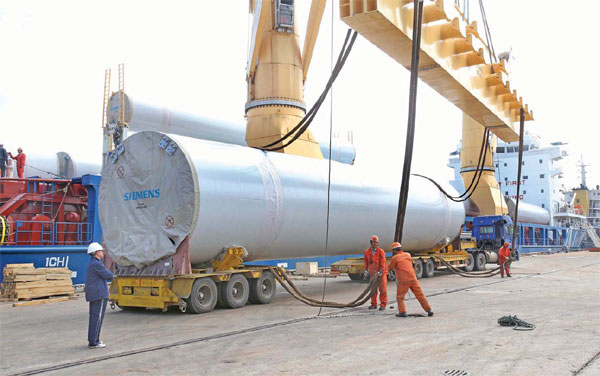Should I stay, or should I go?

Analysts share their views on what Brexit could mean for China-UK trade and relations
Britain's trade relations with China, celebrated as a key part of a golden era during President Xi Jinping's state visit in October, are likely to be affected if Britons vote to leave the European Union in a referendum on June 23.
Analysts and policy experts contacted by China Daily believe the UK would be at a disadvantage in any trade negotiations in the event of a "leave" vote.
| Wind turbine towers produced by CS Wind China in Lianyungang, Jiangsu province, are prepared to be shipped to the United Kingdom. Britain's trade relations with China are likely to be affected if Britons vote to leave the European Union, experts say. Provided to China Daily |
Attention here is already focusing on the effects of the referendum's result, which will be known early on June 24, London time.
China has cautiously implied it would favor the status quo. On his visit in October, Xi reportedly indicated to Cameron that China would prefer the UK to remain in the EU - a position later confirmed in a Foreign Ministry statement.
Last month, Yao Ling, deputy director of a research center under China's Ministry of Commerce, warned in a ministry-run paper that those investing in Britain as a way into the EU would see the "bridgehead curtailed" if the country exits the EU.
In May, Ipsos MORI surveyed 667 international businesses with operations in Britain. Of the 26 Chinese businesses included, 29 percent said a Brexit (a name coined by the British media) would have a very negative impact on their company's future investment decisions, 21 percent said the impact would be fairly negative, 39 percent said it would have no effect and 11 percent did not know. Not one company said it expected a very positive or fairly positive effect.
Chinese investment has flooded into Britain over the past decade, and UK exports to China have more than doubled since 2010. Cameron led a business delegation to China in 2013 when he spoke of lifting the "bamboo curtain" of European trade barriers to China. President Xi's visit heralded deals worth 40 billion pounds ($57 billion; 50.6 billion euros).
As of November, the last set of official figures available, UK exports to China were worth 18.7 billion pounds, with Chinese imports running at 38.3 billion pounds. Although Britain had a surplus with China in the services sector, this was countered by a deficit in the trade of goods.
Both sides offer competing narratives on what will happen to the Britain and China's "special relationship" should the public vote to leave the EU.

The line from the Leave camp is that Britain would greatly benefit from a bilateral free trade agreement with China, something the European Commission has so far been unable to reach.
John Zai, founder and CEO of Cocoon Networks, a China-funded private equity company in London, is among the Chinese businessmen who said they believe the idea of Britain leaving the EU is bad. He said it would harm the prospects for Chinese investment in European companies.
Cocoon's business includes buying equity stakes in European businesses that market their activities through London-based networks to attract international investors. "This process may become more difficult if London stops being seen as the deal negotiation center for mergers and acquisition activity for European firms," Zai says.
In addition, he adds, the lack of a free flow of resources between Europe and Britain will reduce the UK's competitiveness, which in turn would make British firms less attractive as equity investment targets for Chinese companies.
Others hold a different view.
"I think we would do a good deal with China in a relatively short amount of time," says Geoffrey Clifton-Brown, a legislator who is chair of the Conservative Friends of the Chinese. "Rather than EU bureaucracy getting in the way, I think our trade with China is likely to go from strength to strength.
"I actually think it would be both in China's interests and the UK's interest if we came out of the EU. We should do a trade deal that suits both of us, and suits our businesses."
Clifton-Brown points to China and Britain working together to establish London as the biggest trading center outside Beijing for renminbi as an example of the kind of moves Britain would be able to make as a standalone nation.
"This had nothing whatsoever to do with the EU," he says. "If we can do colossal deals like that, there is no reason why we shouldn't go on doing other deals."
Andy Clayton, chief executive of LNP China, which helps companies do business with China, says if Britain were to leave the EU, then the country would have to rely on financial services as its most potent leveraging tool.
"The disparities (between the British and Chinese economies) are on several levels, and within that lay both an opportunity and a challenge," he says, explaining that negotiations would inevitably be one-sided. "Typically, the nature of FTAs is that they reflect the relative strengths and weaknesses of the two economies, and I think the opportunity for Britain is to somehow leverage our position in the financial services."
Those who support the Remain campaign, however, fear that China's interest in Britain would cool, as the Chinese seek out an alternate gateway into the European single market.
"We'd be immeasurably weakened," argues Lord Clement-Jones, a Liberal Democrat peer and deputy chair or the All Party Parliamentary China Group. "There's an element of suspended disbelief - the idea that we're going to leave a trading bloc of 500 million people is a little bit incredible as far as (the Chinese) are concerned. They think of us as being firmly rooted in the EU. They talk about Europe a heck of the lot of the time, not about Britain."
Philippe Le Corre, a policy analyst in China-Europe relations and a fellow at the Brookings Institution think tank, echoes this sentiment: "The UK market is just not big enough or interesting enough for China. What is interesting for China is the whole of the EU."
Fredrik Erixon, an economist and former adviser to China's commerce and finance ministries, says the idea that Britain would be able to leverage market access reforms in China in any trade agreement as a standalone nation is a "naive proposition".
"The opportunities are scarce (in the event of a leave vote). What I recommend if (Britain) did leave is to become the Hong Kong of Europe," he says. "To deregulate, cut taxes ruthlessly, cut spending ruthlessly, take away not just regulations that come from the EU, but all regulations that have been generated domestically, and use that as an opportunity to change the composition of policy in the country."
Nigel Evans, an MP and vice-chairman of the All Party Parliamentary China Group, who supports the Leave campaign, points to an absence of free-trade deals with some of the world's largest economies as a strike against a remain vote in terms of trade.
"It's just startling that the EU doesn't have trade deals with three of the biggest or fastest growing economies in the world - China, India and the United States. I believe, post-Brexit, we have the opportunity to forge new alliances, to forge new trade deals, and I think China will be very high on the shopping list."
Evans believes Britain would be more dynamic in the absence of what he identifies as stifling levels of bureaucracy inherent to the EU.
"The UK without all of this unnecessary red tape will forge deals more quickly, speedily and reorientate those areas where we do have strength toward the Chinese market in a much better way," he says. "Post-Brexit, where the doors of the EU have been firmly shut toward China, Britain will be open for business with China on a much greater basis."
However, Kerry Brown, director of the Lau China Institute at King's College London, believes the Chinese government has signaled that it sees a decision to leave the EU as a reckless one.
"They would think the logical thing to do for any country of any size is to make friends and groups around itself, optimize its influence and impact, and that it is extremely perverse to walk away from the world's largest trading group," he says.
Brown adds that a Brexit would remove Britain's status as a "launch pad" for Chinese investment in Europe.
These comments are somewhat at odds with remarks made in 2014 by Wang Hongzhang, chairman of China Construction Bank, in a BBC interview: "Whether the UK will stay in the EU or not will not do any harm to trade and economic ties or financial relations between the UK and China."
Lord Clement-Jones believes that these competing narratives from leading Chinese figures, and the diplomatic phrasing of the Ministry's statement on the EU referendum, are born from a dual impetus to both make clear that China would prefer Britain to remain in the EU and to emphasize that relations would not be damaged beyond repair in the event of a vote to leave.
"What Wang is trying to do is reassure people that life won't end, and of course life won't end, but it will be much more difficult," he says.
Cecily Liu contributed to this story.
angus@mail.chinadailyuk.com
(China Daily European Weekly 06/17/2016 page8)
Today's Top News
- Takaichi must stop rubbing salt in wounds, retract Taiwan remarks
- Millions vie for civil service jobs
- Chinese landmark trade corridor handles over 5m TEUs
- China holds first national civil service exam since raising eligibility age cap
- Xi's article on CPC self-reform to be published
- Xi stresses improving long-term mechanisms for cyberspace governance































